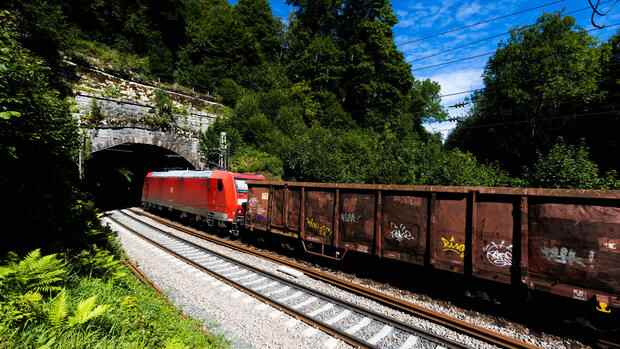Only a billion profit from the logistics subsidiary Schenker brings Deutsche Bahn into the black.
(Photo: dpa)
Frankfurt A billion-dollar profit by the rail logistics subsidiary Schenker has led the state-owned company back into the black in the first half of the year. An operating profit of almost 1.2 billion euros from the international freight forwarding subsidiary lifted Deutsche Bahn above the break-even point. According to the Reuters news agency, this emerges from corporate documents.
Deutsche Bahn will not officially present its figures until Thursday. The railway declined to comment.
Long-distance traffic with IC and ICE also recovered despite problems with punctuality after the corona crisis. The bottom line is that the group made a good 420 million euros in profit after having recorded a loss of 1.4 billion in the same period last year. He also performed significantly better than planned. Sales also increased sharply to almost 28 billion euros, mainly because of Schenker.
With land, air and sea freight, Schenker benefits from the scarce freight capacities worldwide and can therefore charge significantly higher prices. In the first half of 2022 alone, the logistics subsidiary made as much profit as in the whole of 2021 – and this was also a record result.
Top jobs of the day
Find the best jobs now and
be notified by email.
Deutsche Bahn had announced that it would return to profitability in its operating business for the full year 2022. Since the operating result before interest and taxes (EBIT) is now more than 870 million euros after just six months, the forecast should be raised significantly.
Schenker record fuels sales debate
The Schenker result will also continue to fuel the debate about selling the business: the Greens and FDP in particular see international business as a foreign body to the railways. A sale could also remove part of the mountain of debt of around 30 billion euros.
On the other hand, the profit shows that Schenker is an important pillar for the group. Transport Minister Volker Wissing (FDP) has not yet committed himself to Schenker’s future.
The core business in Germany, on the other hand, reported a loss of half a billion euros, but also performed better than Deutsche Bahn itself had predicted. The recovery in long-distance traffic was positive after passengers returned in large numbers after the corona crisis.
An operating loss of around 200 million euros remained. A year ago, however, the minus was still well over one billion euros and even exceeded the division’s sales.
Although rail freight transport was also able to increase its turnover, it remained in the crisis with an operating loss of 300 million euros. Great hopes rest on him when it comes to shifting goods from trucks and protecting the climate.
However, the railway network is dilapidated in many places. The Cargo subsidiary has to turn down orders, and military and grain transports during the Ukraine crisis make business even more difficult. In the autumn, the government also wants more coal transports to supply plants that in turn will replace gas-fired power plants.
More: Chaos on the train: “The nine-euro ticket makes you sick”
